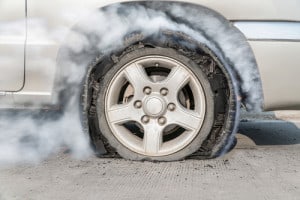
Tire Defects: What Is a Tire Defect & Do I Have a Claim?
Tires are an essential component of motor vehicles. As the only piece of automotive equipment that makes contact with the road, tires can impact how a vehicle accelerates, turns, and stops. Consequently, the condition, quality, and durability of tires can be pivotal to the safe operation and handling of motor vehicles.
Tragically, however, many vehicles on the roads are equipped with unsafe tires. These dangerous tires cause at least 11,000 car accidents every year in the U.S.1
When dangerous tires contribute to car wrecks, tire manufacturers and/or others may be liable for compensating victims for their suffering, injuries, and losses.
At the Amaro Law Firm, our lawyers are experienced at representing injured people in various types of tire defect claims. Relentless, diligent, and strategic, we can help you build the strongest possible claim.
Hurt by a Defective or Faulty Tire?
Call (713) 352-7975, Text (281) 612-8024 or Email Our Firm
for Your FREE, No Obligations Consultation
We are ready to review your potential claim, answer your questions, and explain your legal options. Free virtual and mobile consultations are available to anyone who cannot visit our offices.
Do I Have a Tire Defect Case?
Tires can fail and cause accidents for any number of reasons. In some cases, a vehicle owner’s failure to maintain or replace worn-out tires may be to blame. In others, the negligence of another party may be involved. Such negligence can come at the hands of manufacturers, retailers, and/or others, and it can involve:
- Design flaws
- Manufacturing errors
- Failures to test the safety of tires before bringing them to market
- Installation mistakes or oversights.
A lawyer at the Amaro Law Firm can go over the details of your accident to help you determine whether you may have a tire defect claim – and, if so, the available legal remedies.
How to Collect & Preserve Evidence for a Tire Defect Claim
Proving that a defective tire played a role in causing a crash can be a complicated endeavor. Commonly, it requires various pieces of evidence to establish the nature of the defect, how it contributed to an accident, and the resulting injuries and losses. Generally, some key evidence for tire defect claims can include:
- Accident scene photos
- Pieces of damaged tires
- Expert witness testimony
Knowing what evidence to collect, as well as how to preserve and present it, can require the insight and guidance of an experienced attorney at the Amaro Law Firm.
Design Defects in a Tire Defect Claim
The design of a tire plays a major role in the durability, performance, and longevity of that tire. While various improvements in tire design have been made since the 1940s, many modern tires are still plagued with design flaws.
Oftentimes, these flaws arise from manufacturers’ focus on cutting costs and maximizing their profits. Examples of tire design flaws include (are not limited to):
- Belt wedge flaws
- Cap ply defects
- Skim stock flaws
- Inner liner defects.
When tires have these or other design defects, they are far more likely to experience premature failures, like tread separation and blowouts.
Manufacturing Defects in Defective Tire Claims
While tires are generally manufactured according to distinct specifications, it is not uncommon for mistakes to be made during the manufacturing process. These mistakes can essentially build defects into tires, causing flaws like (but not limited to):
- Trapped air in tires
- Material contamination
- Damage to a tire’s inner liners
- Belt alignment problems.
These and other manufacturing defects can degrade the performance and durability of tires, increasing the risk of tread separation, blowouts, and other tire failures.
Tire Defect Claims Involving Imported Tires
Tire defect claims can be complex cases. This is particularly true when these claims involve imported tires, as liability can be shared by a number of parties. One of these liable parties is typically the importer, according to U.S. law. That is due to the fact that U.S. law subjects tire importers to the same responsibilities as domestic tire manufacturers.
Retailer Liability in Tire Defect Claims
Retailers and service centers are also among those who can be liable when tire defects and failures cause crashes. Specifically, retailer and service center liability in a tire failure claim may arise if or when these parties:
- Fail to notice or replace aging tires
- Misplace tires during the installation process
- Sell recalled or damaged tires.
Why Tire Recalls Have Poor Completion Rates
Although tire recalls are focused on repairing or replacing unsafe, defective tires, these recalls are the least successful of all vehicle-related recalls. In fact, federal transportation regulators have reported that tire recalls are only about 41 percent successful, on average.2 These poor completion rates stem from various factors, like (but not limited to):
- Inadequate information regarding all owners who must be notified of the recall
- Outdated owner contact information
- Owners choosing to not take action to respond to recalls.
Ultimately, this results in many faulty, dangerous tires remaining on the roads and presenting serious risks to the driving public.
Contact a Houston Personal Injury Attorney at the Amaro Law Firm for Exceptional Advocacy in Any Tire Defect Claim
If you or a loved one has been harmed by any type of tire defect or failure, a Houston personal injury attorney at the Amaro Law Firm is ready to explain your legal options and provide you with exceptional advocacy moving forward.
Call (713) 352-7975, Text (281) 612-8024, or Email Our Firm for Your FREE Consultation and important answers about your potential claim.
The Amaro Law Firm’s record of extraordinary representation and success in tire defect (and other product liability) claims has earned us glowing testimonials from former clients and 5-star ratings on Google and Facebook.
________________________________________________________________________________
1: According to the latest data from the National Highway Traffic Safety Administration (NHTSA)
2: According to the NHTSA’s Safety Recall Completion Report
